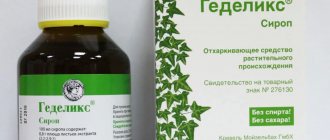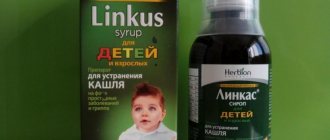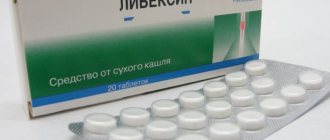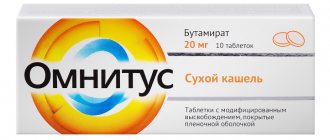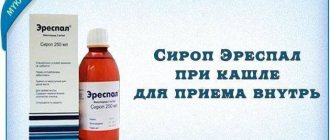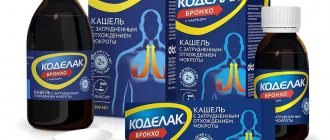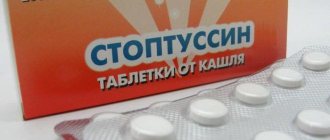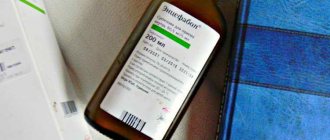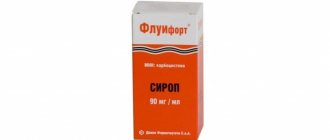To stop the manifestation of a cough reflex that is dangerous for a pregnant woman, the attending physician will determine how ready the woman’s body is at the moment to take an effective drug and how safe the effect of the drug will be for the unborn child.
Not all drugs with mucolytic and expectorant properties are suitable for pregnant women to treat cough. The presence of alcohol, potent substances or substances that penetrate the placenta makes it impossible for pregnant women to use many antitussives.
How do doctors evaluate the effective drug Bronchicum, created on the basis of medicinal plants?
- It is advised to treat it very carefully, since the medicine contains ethyl alcohol, which is dangerous to the fetus.
- The appointment is carried out only in case of danger to the mother’s health or risk of miscarriage due to severe cough.
- It is recommended to refrain from taking the drug, regardless of the stage of pregnancy, if it is possible to cure the cough using other means.
Composition and release form
Bronchicum is presented in four formats:
| Bronchicum S syrup | Elixir | Drops | Pastilles | |
| Description | Clear reddish-brown liquid | Brown lozenges | ||
| Concentration of thyme herb extract, g | 15 per 1 ml | 1 per 100 ml | 22 per 100 ml | 100 per piece |
| Auxiliary components | Ammonia (extractant), water, ethanol, citric acid monohydrate, sodium benzoate, sugar solution, rose oil, dextrose, honey flavor, invert syrup, cherry juice concentrate | Water, ammonia solution, ethanol, glycerin, spring primrose root extract, wildflower root extract, quebracho bark, sucrose, fructose, sodium benzoate, dextrose | Tincture of white soap root, quebracho bark, ethanol | Glycerin, ammonia, ethanol, magnesium stearate, water, colloidal silicon dioxide, povidone, stearic acid, levomenthol, acacia gum. cineole |
| Package | Bottle 100 ml, sachets 5 ml (8 or 20 sachets in a pack) | Bottle 130 ml | 50 ml bottles | Blisters of 10 pcs., packs of 2 blisters |
Directions for use and dosage
The form of release of the drug affects its method of use. Lozenges are intended for resorption, drops, elixir and syrup are for oral administration. The dosage depends on the type of disease, the age of the patient, and his or her tolerance to the drug.
Bronchicum syrup
After meals, take Bronchicum syrup. Adults and adolescents over 12 years of age should consume 2 tsp. (10 ml) or 2 sachets three times a day at equal time intervals. Before use, shake the bottle and knead the sachet with your hands. The duration of therapy is determined individually.
Drops
Bronchicum elixir is intended for internal use. Adults and patients over 12 years of age should take a teaspoon (5 ml) up to 6 times a day at equal time intervals. The average course of treatment lasts 10-14 days. The attending physician can increase it if necessary. Similarly, drops are used internally, which are taken 20-30 drops 3-5 times a day. Before use, shake the bottle by lightly tapping the bottom.
Bronchicum lozenges
Adults and children over 12 years of age should slowly dissolve the plates in the mouth, 1-2 pieces at a time. in a day. The duration of treatment is determined by the severity of the symptoms of the disease, its duration and the characteristics of the patient’s recovery.
Instructions:
Clinical and pharmacological group
12.025 (Phytopreparation with expectorant, antimicrobial and bronchospasmolytic effects)
Release form, composition and packaging
◊ The pastilles are round, slightly biconvex, cream-colored with small inclusions.
| 1 lozenge | |
| liquid extract of thyme herb (1:2-2.5) | 100 mg |
Extractant: ammonia solution 10%, glycerol 85%, ethanol 90 vol.%, water (in the ratio 1:20:70:109).
Excipients: sucrose, povidone, levomenthol, cineol, acacia gum, stearic acid, colloidal silicon dioxide, magnesium stearate.
10 pieces. - blisters (2) - cardboard packs.
◊ The syrup is clear or slightly opalescent, reddish-brown in color, with a faint odor of honey.
| 100 ml | |
| liquid extract of thyme herb (1:2-2.5) | 15 g |
Extractant: ammonia solution 10%, glycerol 85%, ethanol 90 vol.%, water (in the ratio 1:20:70:109).
Excipients: sodium benzoate, rose oil, honey flavor, cherry flavor (concentrated cherry juice), invert sugar syrup (sucrose, dextrose, fructose), liquid dextrose, sugar syrup 67% (sucrose), citric acid monohydrate, purified water.
100 ml - glass bottles (1) complete with a dosage cup - cardboard packs.
pharmachologic effect
The drug has an expectorant, anti-inflammatory, antimicrobial effect, helps reduce the viscosity of sputum and accelerate its evacuation.
Pharmacokinetics
In accordance with the International Convention (EMEAHMPWG11/99), when conducting clinical trials of herbal preparations, an isolated study of pharmacokinetic parameters is not required.
Dosage
Bronchicum® S in syrup form is administered orally after meals. Adults and adolescents - 2 teaspoons of syrup (10 ml) 3 times a day; children aged 6 to 12 years - 1 teaspoon (5 ml) 3 times a day; at the age of 2 to 6 years - 1 teaspoon (5 ml) 2 times a day; children from 1 to 2 years old - 1/2 teaspoon (2.5 ml) 3 times a day; at the age of 6 months to 12 months - 1/2 teaspoon (2.5 ml) 2 times a day. Cough syrup should be taken at regular intervals throughout the day.
Bronchicum® C in the form of lozenges is prescribed to adults and children over 12 years of age, 1-2 lozenges up to 3 times a day; children aged 6 to 12 years - 1 lozenge 3 times a day.
The duration of use of the drug is determined by the therapeutic need and duration of the disease.
Overdose
There have been no reports of cases of intoxication when taking the drug Bronchicum® S.
Drug interactions
Concomitant use with antitussive drugs, as well as with drugs that reduce sputum formation, is not recommended, because this makes it difficult to cough up thin mucus.
Use during pregnancy and lactation
The drug is not recommended during pregnancy and breastfeeding.
Side effects
Allergic reactions: rarely - skin rash, urticaria, Quincke's edema.
From the digestive system: when taking syrup, rarely - nausea, gastritis, dyspepsia.
The patient should be warned to stop taking the drug and consult a doctor if any adverse reactions develop.
Storage conditions and periods
The drug should be stored out of the reach of children at a temperature below 25°C. Shelf life: 3 years.
After opening the bottle, cough syrup can be taken for 3 months.
Indications
- as an expectorant in the complex treatment of inflammatory diseases of the upper respiratory tract, accompanied by a cough with difficult to separate sputum.
Contraindications
- congenital fructose intolerance;
- glucose-fructose malassorption;
- deficiency of the enzymes sucrase and isomaltase;
— chronic heart failure (in the stage of decompensation);
- severe liver dysfunction;
- severe renal dysfunction;
— chronic alcoholism (due to the ethanol content in the syrup);
- children up to 6 months (syrup);
- children under 6 years of age (lozenges);
- hypersensitivity to the components of the drug.
The drug should be used with caution in patients with liver disease, brain diseases and injuries, and epilepsy.
special instructions
Bronchicum® C cough syrup contains 5.6 vol.% ethanol.
If the patient’s condition does not improve, or if there are attacks of suffocation, purulent sputum, or if the temperature rises, you should immediately consult a doctor.
If it is necessary to prescribe the drug to patients with diabetes mellitus, as well as to patients on a hypocaloric diet, it should be taken into account that 5 ml of syrup (approximately 1 teaspoon) corresponds to 0.3 XE; 1 lozenge - 0.07 XE.
Use for renal impairment
Contraindicated in severe renal impairment.
Use for liver dysfunction
Contraindicated in severe liver dysfunction.
Conditions for dispensing from pharmacies
The drug is approved for use as a means of OTC.
special instructions
For proper use, you need to learn about the following special instructions:
- For 1 lozenge there are 0.07 bread units, for 5 ml of syrup - 0.3 XE, for 20-30 drops - 0.02-0.03 XE, which is important for patients with diabetes. During therapy with the drug, you need to follow a diet, eat more fiber, less simple carbohydrates.
- The cough syrup contains 4.9 vol.% ethyl alcohol, the elixir - 5.46%, and the drops - 29.5%.
- If the patient’s condition does not improve, suffocation, purulent sputum develops, and the temperature increases, you should immediately consult a doctor.
- During treatment with Bronchicum, you should drive cars and operate machinery with caution, because concentration may decrease and the speed of psychomotor reactions may slow down.
Contraindications to the use of Bronchicum
According to the instructions, Bronchicum in any form cannot be used for:
- Severe disorders of the kidneys and liver;
- Fructose intolerance;
- Increased sensitivity of the body to the components included in the drug;
- Chronic heart failure.
Bronchicum elixir and syrup are not prescribed for:
- Insufficient levels of the enzymes sucrase and isomaltase;
- Glucose-fructose malabsorption;
- Alcoholism.
The syrup and elixir should be taken with caution by patients with epilepsy, brain injuries, liver diseases and only after prior consultation with a doctor.
Bronchicum cough syrup is not prescribed to children under six months of age, lozenges - to children under 6 years of age; elixir - for children under one year of age.
Bronchicum for children
Medicine dosage for children:
| Age category, years | Syrup | Elixir | Pastilles | Drops |
| 6-14 | 20 3 times a day | |||
| 6-12 | 5 ml three times a day | 1 PC. three times a day | ||
| 2-6 | 5 ml twice daily | 15 per lump of sugar or with hot tea | ||
| 1-2 | 2.5 ml three times a day | |||
| 0,5-1 | 2.5 ml twice daily | |||
| 5-12 | 5 ml 4 times a day | |||
| 1-4 | 2.5 ml three times a day |
Bronchicum cough syrup
Active substance:
Pharmgroup:
Secretolytics and stimulants of motor function of the respiratory tract
Average price in pharmacies
| Name | Manufacturer | average price |
| Bronchicum with 0.1 n20 lozenges | SANOFI RUSSIA | 227.00 |
| Bronchicum tp 130.0 elixir | SANOFI RUSSIA | 353.00 |
Application area:Allergic bronchitis Bacterial infections of the upper respiratory tract Bacterial respiratory infections Bacterial bronchitis Viral respiratory disease Pain due to colds Viral respiratory tract infections Pain in infectious and inflammatory diseases of the upper respiratory tract Inflammation of the lower respiratory tract Inflammatory disease of the upper respiratory tract Inflammatory diseases of the upper respiratory tract Inflammatory diseases of the upper respiratory tract with difficult to separate sputum Inflammatory diseases of the upper respiratory tract with difficult to separate sputum Inflammatory diseases of the respiratory tract Secondary infections with influenza Secondary infections due to colds Sticky sputum production Viscous sputum Hyperproduction of sputum Hypersecretion of bronchial glands Influenza conditions Thick phlegm Bronchial disease Blockage of the bronchi with mucus plug Difficulty in sputum discharge Difficulty releasing sputum Difficulty secreting sputum in acute and chronic respiratory diseases Difficulty secreting sputum in acute and chronic respiratory diseases Difficulty releasing sputum Upper respiratory tract infections Upper respiratory tract infections Viral respiratory tract infections Respiratory tract infections Respiratory and lung infections ENT infections Infectious and inflammatory disease of ENT organs Infectious and inflammatory diseases of the upper respiratory tract Infectious and inflammatory diseases of the upper respiratory tract and ENT organs Infectious and inflammatory diseases of the upper respiratory tract in adults and children Infectious and inflammatory diseases of the upper respiratory tract Infectious inflammation of the respiratory tract Respiratory tract infection Qatar of the upper respiratory tract Qatar smoker Catarrhal inflammation of the upper respiratory tract Catarrhal disease of the upper respiratory tract Catarrhal phenomena from the upper respiratory tract Smokers cough Cough due to inflammatory diseases of the lungs and bronchi Cough in diseases of the upper respiratory tract Cough in diseases of the upper respiratory tract Cough with a cold Cough with hard-to-clear sputum Cough with hard-to-clear sputum Laryngitis Laryngitis acute Fever due to influenza High viscosity sputum Disturbance of bronchial secretion Bronchial dysfunction ARVI acute respiratory infections Acute respiratory infection with symptoms of rhinitis Acute respiratory infection Acute infectious-inflammatory disease of the upper respiratory tract Acute cold Acute respiratory disease Acute respiratory disease of influenza nature Acute tracheobronchitis Sore throat or nose Poor sputum discharge Subacute bronchitis Cold Colds Colds Respiratory infection Respiratory viral infections Respiratory diseases Respiratory infections Recurrent respiratory tract infections Rhinotracheobronchitis Rhinotracheobronchitis Seasonal colds Seasonal colds Acute tracheitis Tracheobronchitis Difficult to clear viscous sputum Difficult sputum Difficult-to-discharge bronchial secretions Difficult to separate viscous secretion Pharyngolaryngitis Chronic lung diseases Frequent colds and viral diseases |
Analogs
Other herbal remedies with an expectorant effect can replace the drug. Analogues of Bronchicum are:
- Dr. Theiss Bronchosept - syrup with plantain extract.
- Herbion plantain syrup is a wet cough syrup based on plantain extract.
- Gedelix - syrup and drops for oral administration containing ivy extract.
- Codelac Broncho - tablets, elixir with thyme, ambroxol, thermopsis extract.
Side effects
The use of Bronchicum may produce undesirable side effects:
- allergic reactions (including urticaria and Quincke's edema);
- irritation of the gastric mucosa.
Most doctors assess the level of side effects as mild, but this is when we talk about use by non-pregnant patients. Pregnancy in any case makes adjustments to the pharmacological picture - the reaction of the expectant mother’s body to a particular drug may be unpredictable.
Price
Cost of the drug in Moscow:
| Type of product, pack volume | Internet price tag, rubles | Pharmacy cost, rubles |
| Elixir 130 ml | 350 | 380 |
| Lozenges 100 mg 20 pcs. | 230 | 250 |
| Syrup 100 ml | 360 | 400 |
| Syrup 5 ml 20 sachets | 190 | 220 |
